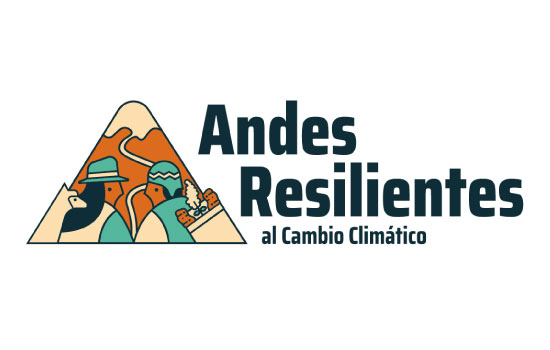Andes Resilientes al Cambio Climático Project (Resilient Andes to Climate Change)

Introduction
Climate change threatens the fragile mountain ecosystems in the Andes and the livelihoods of farmers living in the surrounding areas.
The Andean Regional Initiative on Adaptation to Climate Change will help increase the resilience of the most vulnerable communities that live in the mountain ecosystems of the Andes, to the effects of climate change and natural hazards, by increasing their food security and water, through the sustainable management of natural resources.
Promoting regional collaboration and capitalizing on the lessons learned from previous and relevant programs for adaptation to climate change in the high Andean rural areas; The regional initiative proposes to assist the Andean countries in the implementation of policies and plans that respond to the needs of the most vulnerable communities in these regions.
Likewise, it is expected that they will strengthen their access to financing of measures that support their adaptation; in the development of knowledge and scaling up of good practices that strengthen food and water security for the populations of mountainous regions, while preserving natural resources; and promoting the development of instruments that allow monitoring and generating evidence for effective decision-making in adaptation to climate change.
*This weADAPT article/case study is an abridged version of the original factsheet, which can be downloaded from the right-hand column. Please access the original text for research purposes, full references, and to quote text.
Project objective and partnerships
The project’s objective is to strengthen the resilience of high Andean communities to the effects of climate change and natural hazards, by strengthening their food and water security, through the sustainable management of natural resources.
The regional initiative will support Andean communities in Ecuador, Bolivia and Peru. It will strengthen interaction between government and private actors at various levels to provide services for improving building resilience and capacity to adapt to climate change.
Partners: Ministries of the Environment, Ministries of Agriculture or rural development, and Ministries u organisms with competence in economic and social development and inclusion issues in Bolivia, Ecuador and Peru.
The project is funded as part of the Swiss Agency for Development and Cooperation’s (SDC) Global Programme on Climate Change and Environment and facilitated by the HELVETAS Swiss Inter-cooperation and Fundación Avina consortium.
Intervention strategies
Resilient Andes will coordinate with national and sub-national government programmes and projects that contribute to (high Andean) communities’ adaptation to climate change. The project will map each country’s current activities and their probable evolution, in order to contribute to those with the potential to have positive impact.
National technical committees support the coordination in the region and the planning for the Resilient Andes project. Their role is to ensure that actions are in line with the strategic climate and sector priorities of each country, for adaptation to climate change, agricultural production systems, water management and economic and social inclusion. They are also responsible for drafting and overseeing implementation of the Action Plans for Resilient Andes. The Action Plan for Peru for example has priority activities for taking climate change adaptation measures supporting Peru’s National Level Contributions (NDCs) in the areas of agriculture and water.
Expected outcomes
- Policies strengthened and implemented National and sub-national climate change adaptation policies strengthened and implemented, giving priority to the adaptation needs of poor and vulnerable high Andean rural communities.
- Best practice scaled up Good climate change adaptation practices that strengthen the food and water security of poor and vulnerable high Andean rural communities are scaled up, through national rural poverty reduction and other major programmes, based on solid evidence of their effectiveness.
- Progress in adaptation measured and reported Partner countries report on progress in adaptation to climate change of poor and vulnerable high Andean rural communities, by monitoring with indicators for transparent reporting and verification of the effectiveness of the adaptation policies and measures implemented with a systemic and inclusive approach.
- Globally shared regional learning Andean regional learning on climate change adaptation with a pro-poor approach is highlighted and shared globally with decision-makers and stakeholders from other mountain regions in UN Framework Convention on Climate Change platforms
Key resources
- Report of session on Building a common inter-agency agenda for adaptation to climate change in Peru
- Project page for Andes Regional Project Resilient to Climate Change (in Spanish)
- Publications page
- YouTube channel of Resilient Andes to Climate Change
- Andes Regional Project Resilient to Climate Change – Ecuador (in Spanish)
- Andes Regional Project Resilient to Climate Change – Perú (in Spanish)
- Andes Regional Project Resilient to Climate Change – Bolivia (in Spanish)
Suggested Citation:
‘Regional project: Resilient Andes to Climate Change – Fact Sheet’, (2021), Swiss Agency for Development and Cooperation.
Related resources
- Project page for Andes Regional Project Resilient to Climate Change
- Brochure Andes Resilientes al Cambio Climático (in Spanish)
- Publications page of Resilient Andes to Climate Change
- YouTube channel of Resilient Andes to Climate Change
- PACC Peru Climate Change Adaptation Programme: Strengthening actions, scaling up responses
- Himalayan Adaptation, Water and Resilience (HI-AWARE) Research on Glacier and Snowpack Dependent River Basins for Improving Live
- Adaptation to Climate Change in the Andes: gaps in understanding
- Current state of climate change policies and adaptation strategies in the Andes
(0) Comments
There is no content